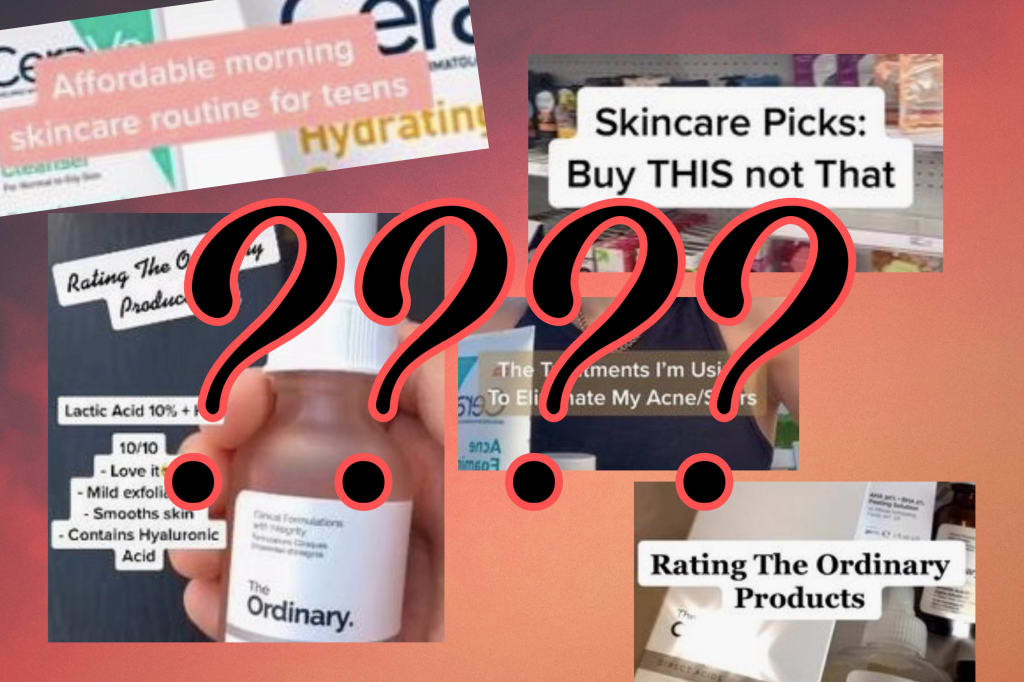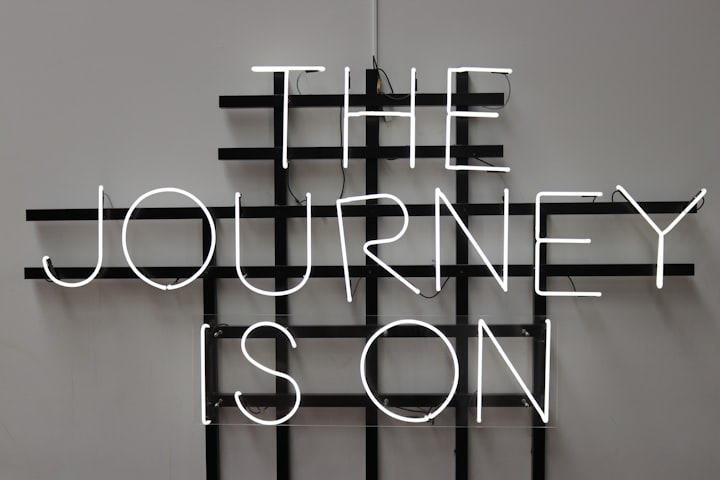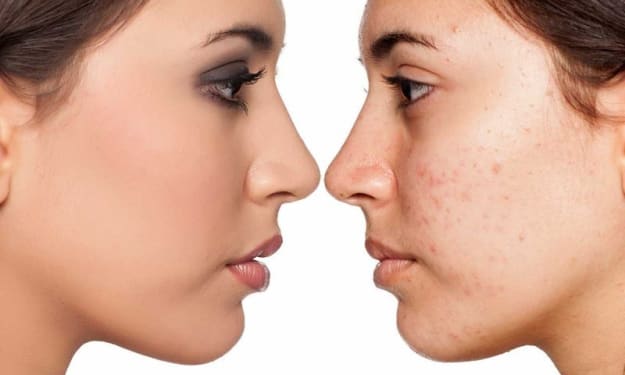The Thinly Veiled Capitalism Behind Skinfluencing
From Tiktok to Pinterest, influencers have suddenly become dermatologists, salespeople, and life coaches all in one.

When it comes to skin problems, looking for answers was exhausting back in the day. I mean, I remember being 12 and seeing a Proactiv commercial on MTV and my research stopped there before I decided it would cure my acne. But now, hormonal middle schoolers and prematurely wrinkling 20 year olds alike need look no further than TikTok, where they can get all the answers they could have ever wished for from...an influencer?
Wait. Seriously?
I mean, I guess. Sure, it makes sense considering all the other wild stuff that 2021 has somehow managed to procure.
At first, I didn't see a huge problem with influencers and skin care enthusiasts invading Instagram explore pages nationwide. To be honest, it made my job a lot easier when people would come into Sephora and already knew what they wanted. Not a huge fan of talking to people. But being the general pessimist I am, the "recommendations" I was seeing crop up from skinfluencers seemed troubling to say the least.
And so, because I can't mind my own business, I did some digging.
This is not a big exposé on any one skinfluencer. Hyram has certainly done wonders for educating young people on ingredient contents. What's on Vi's Face has remained an amazing resource for SPF knowledge and resources. Love that for them and all the preteens who will never have the cystic acne phase that is forever memorialized in my 7th grade yearbook photo. What I don't super love is making a gimmick out of skincare and skin issues for brand deals, views, and Adsense. Which probably seems either really bitter or really petty of me, or both.
Except that it's really not about being petty or spiteful or whatever. Your skin is, shockingly, part of your body! In fact, your skin (and maintaining its health and integrity) is essential to keeping you alive and healthy every single day. Not only is your skin your first line of defense for any pathogens that might want to enter your little corporeal form, your skin also regulates your body temperature so you don't freeze or overheat. Your skin excretes nasty body waste stuff, and absorbs some good select stuff too. On the flip side, your skin is extremely vulnerable and prone to all sorts of ailments and issues. Some more annoying like acne, and others life threatening like malignant melanomas. All that being said, your skin is clearly pretty essential to your life, just like your heart or your brain. If you woke up one day and you had a pain in your chest, would you check TikTok to see what your favorite cardiofluencer says you should do?
To me, it's the same with skin. I applaud dermatologists like Dr Zion who set the record straight on many skinfluencer claims by using her actual medical degree. Even as someone with over 1000 documented hours of hair and skin education (and even more to go lol) I rarely, if ever, feel qualified to give a completely conclusive answer to someone struggling with acne or dark marks or wrinkles right off the bat. In fact, it would take me quite a bit of understanding of their lifestyle, the products they previously used, their health factors, and a comprehensive facial where I can physically touch their skin before I'd feel confident in any recommendation. How are skinfluencers able to say, "If you have acne, you need this glycolic toner because it'll fix everything!!" without acknowledging genetic, environmental, and physical aspects that can also cause acne?
That's a rhetorical question, by the way.
Here's why: brand deals.
Anyone can cosplay as anything if there's money involved. Unfortunately, it doesn't take much to become a skinfluencer. Learn a few buzzwords like AHA and salicylic acid, remember a few key products to recommend like Cera Ve cleansers and serums from The Ordinary and bam! Skinfluencer. If you play your cards right, you'll receive offers from all sorts of skincare and skincare adjacent brands. Some will be MLM pyramid schemes like Monat, others will be more legit and offer you an actual partnership. And let's be frank: if I could choose between going to work in the apocalypse or staying at home and getting paid to read off a script once a week on my Insta stories, I think anyone would choose the latter.
In this way skinfluencing can be tricky at best and sinister at worst. I do think there are a good amount of skinfluencers who want to see their audience enjoy the products they recommend because, well, their salary and reputation depend on it. But if you're a normal person, seeing people take your advice and succeed is gratifying too. I do think, though, that there are predatory brands and predatory influencers alike.
There's a few basic pitfalls they use: for example, catering to younger audiences. When I was 14, I was still putting toothpaste on my zits, so the naivety of little knowledge-thirsted minds can unfortunately be an easy target. I also am wary of skinfluencers who claim one brand solved all their problems. Skinfluencers like Hyram, for example, use Cera Ve but also recommend other brands for different purposes, like Vanicream. As soon as a skinfluencer gets defensive in their recommendation of a brand, or they only say positive things about every single product...well, any credibility they may have goes right down the drain. Lastly, I have a general distrust for those who make memes out of skincare, especially when those memes shame other brands and the people who use them. Sure, St Ives is super abrasive on the skin, but so is recommending The Ordinary AHA BHA peeling solution to someone with dry skin. If you're an online skincare junkie, I know you've seen a ton of similar memes lately.
So how do you know what products are good for you? How are you supposed to know what to use? Above all else, go to a dermatologist. If you're in hellscape America right now, that may not be an option, so I recommend a thorough consultation with an esthetician, too. The good thing about seeing professionals in real life is that it's real life. The texture, type, integrity, and contraindications can be seen clear as day and recommendations can be made while taking all of that into account. An esthetician or dermatologist can also keep a comprehensive list and records of your health and products, which can all factor into skin changes as well. Since Covid19 is still rampaging the world though, the second best thing I can recommend is self education. Podcasts like The Beauty Brains break down product myths and do thorough walkthroughs of ingredient lists. If you're still inclined to social media, try watching what dermatologists have to say about buzzword products and topics, instead of taking thinly veiled ads at face value.
While it may seem exhausting to find products that work for you, it's important to keep in mind these red flags not only from influencers but from brands themselves. Drunk Elephant has come under fire in the past for how they treated those giving negative reviews, but I rarely hear reputable brands like La Roche Posay in the beauty rumor mill. It's important to find brands and people who believe in what they're selling, not just the money it makes them.
It may feel like your favorite skinfluencer is your best friend, your dermatologist, and your life coach all rolled into one. But sometimes, it's best to be your own advocate, especially when it comes to the health of your body.
About the Creator
Lillie Superstar
semi-professional face and hair toucher with a lot to say






Comments
There are no comments for this story
Be the first to respond and start the conversation.